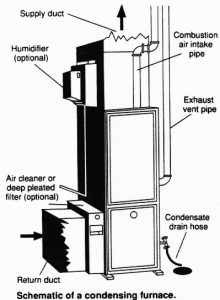How Does an Oil Heating System Actually Make Heat?
 Oil heat is common in our area, and many New Jersey homeowners continue to make the switch. Natural gas can be costly to transport, and electric-based systems often drive up utility bills, making oil heating even more appealing. Though when thinking about investing in a new system or continuing maintenance on your existing unit, you may find yourself wondering how it actually produces heat. Our team of professional heating service technicians explain below.
Oil heat is common in our area, and many New Jersey homeowners continue to make the switch. Natural gas can be costly to transport, and electric-based systems often drive up utility bills, making oil heating even more appealing. Though when thinking about investing in a new system or continuing maintenance on your existing unit, you may find yourself wondering how it actually produces heat. Our team of professional heating service technicians explain below.
Types of Available Units
Contents
In order to create heated air, electric furnaces use electrical resistance while natural gas units burn a combination of natural gas and air. Propane is a manufactured gas that produces heat in the same way. There are several types of oil heating systems, which also use a burner flame to create heat. The unit produces hot air, water, or steam, which is circulated through the home’s vents via pipes. Combination units supply the home with both hot air for warmth and hot water for use in bathrooms, kitchens, and laundry rooms.
Understanding the Fuel
Many people confuse fuel oil with gasoline. Although the two are related; they are not the same. During the refining process, crude oil has gasoline, kerosene, and other volatile parts removed. Some of the remaining substance is further refined into fuel oil, which is non-explosive and ready for use in homes and businesses. High-quality heating oil fuel can indeed save you a lot of money on your heating bills. Thanks to competitive national and local pricing, it is easy to ensure you are getting the best price for your property’s needs.
Vaporizing Liquid to Produce Heat
Fuel oil is not burned directly over a burner, as it will not burn in its liquid state. This quality makes the fuel very safe to transport, store, and use, because it will not combust. Instead, the unit uses pressure to force the fluid into a fine mist of particles that is mixed with oxygen. The vaporized mix is warmed above the burner, which in turn heats the air, water, or steam that will warm your home. It is imperative to schedule regular inspections and maintenance to ensure the combustion process is efficient and effective.
Benefits of Purchasing or Upgrading Your System
Oil heating systems are highly efficient, as the burners maintain a steady flame within a sealed chamber. The result is very even heating, producing a warm and cozy effect. Every time your unit kicks on, your home will heat quickly and efficiently. Less energy is used when homes are heated faster, meaning that you may notice a difference in your utility bill if you switch to oil. Upgrading to a new unit can also improve efficiency, thanks to design improvements and technological advancements.
Home and business owners in Ocean and Monmouth counties can rely on Point Bay Fuel, a full-service company that provides installation, servicing, and fuel delivery. We also provide inspection and cleaning services to extend the life of your system and keep your home heated properly all season long. For more information, call us at (732) 349-5059 or fill out our online contact form for a prompt reply.
